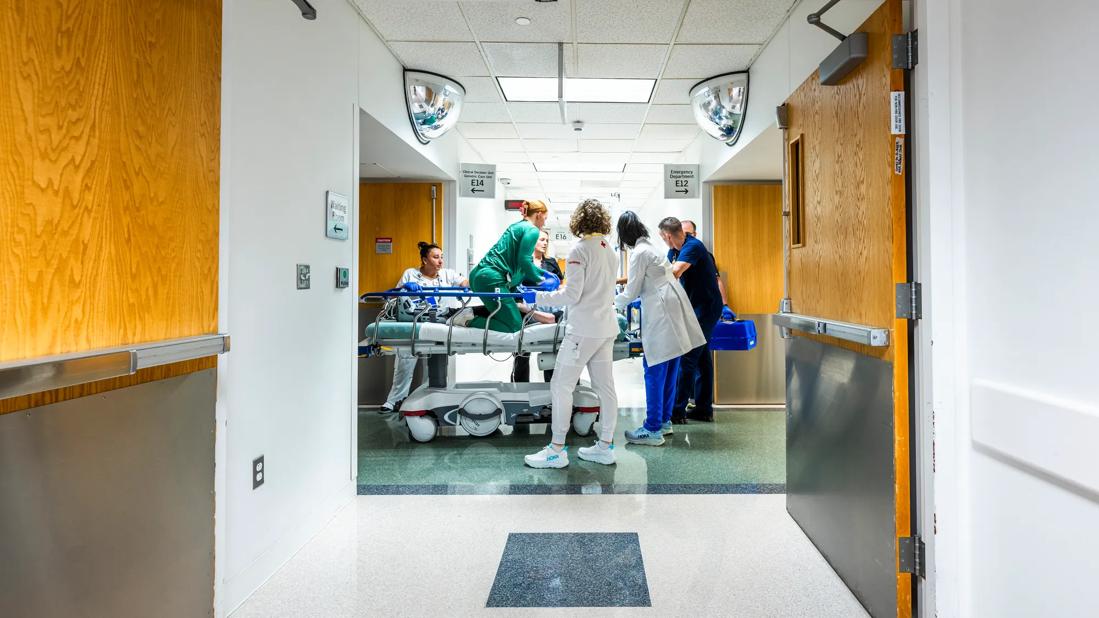The grassroots national campaign is launched at Medina Hospital

Of the 5 million deaths from accidental and nonaccidental trauma around the world each year, approximately one-third are caused by exsanguination, according to an article in the Journal of Emergency Medical Services. In 2015, a federal interagency workgroup started the Stop the Bleed® national awareness campaign to cultivate grassroots efforts that encourage bystanders to become trained, equipped and empowered to help in a bleeding emergency before professional help arrives. Last year, nurses at Cleveland Clinic Medina Hospital brought the campaign to their community.
Advertisement
Cleveland Clinic is a non-profit academic medical center. Advertising on our site helps support our mission. We do not endorse non-Cleveland Clinic products or services. Policy
“Because I’m involved with emergency management, it occurred to me that this would be a great initiative for our hospital to do as community outreach,” says Donielle Finding, MSN, MBA, CCRN, Director of Nursing for Critical Care Services at Medina Hospital. “I hoped that if we started it here at Medina Hospital, then our community and schools would get on board, and that has happened.”
In June 2018, Medina Hospital held three classes to prepare caregivers as instructors for the Stop the Bleed program. Nurses and paramedics from Medina Hospital, as well as the free-standing Emergency Department at Cleveland Clinic’s Brunswick Family Health Center, participated in the class.
Last November, nearly 20 community members attended the first course. They ranged from firemen to leaders of Boy Scout troops and staff from local schools. The two-hour class covered how to identify site sources of bleeds and apply pressure, dressings and tourniquets.
“There are a lot of things people can do at home or the site of the accident before they get to an emergency room. We want them to feel empowered to do those things,” says Lauren Rogers, MSN, RN, NE-BC, Nurse Manager of the Medina Hospital Emergency Department. “Just as CPR is important, so is learning the steps to keep a bleeding person alive.”
In January, nurses from Medina Hospital held a Stop the Bleed class at Medina High School. The school initially reached out to the hospital for tourniquets for its bucket initiative, which entails placing a bucket of supplies in each classroom in case of an emergency where students and teachers need to shelter in place. A $4,000 donation from the Medina Hospital Foundation covered expenses for the tourniquets.
Advertisement
“We wanted to not only give them the tourniquets, but also make sure they knew how to use them correctly,” says Rogers. “A lot of the class time is spent trying them on yourself and others so if you’re faced with a real-life situation where you have to use tourniquets, it’s not so scary.”
Learning steps to stop bleeding isn’t just about mitigating deaths in mass shootings and other high-profile events. “We tell people, ‘If you have a lawnmower, you need to learn this skill because accidents happen,’” says Rogers. “Sure, there are tragic shootings. But the likelihood of those happening is minimal. There’s a greater chance of having an accident in the yard or with a garbage disposal.”
In the past several months, Medina Hospital has had several requests to host Stop the Bleed classes, from other city schools, the chamber of commerce, the mayor’s office and other groups. They are considering how to meet the growing demand to teach these potentially life-saving skills.
“It started out as a community service project, and it’s really grown arms and legs,” says Finding. “There are a lot of people interested in Stop the Bleed.”
Advertisement
Advertisement

Planning continues with critical, patient-focused input from nursing teams

Strengthening care through targeted resources and frontline voices

Embracing generational differences to create strong nursing teams

CRNA careers offer challenge and reward

An unexpected health scare provides a potent reminder of what patients need most from their caregivers

Cleveland Clinic Abu Dhabi initiative reduces ICU admissions and strengthens caregiver collaboration

Veteran nurse blends compassion, cutting-edge transplant training and military tradition to elevate patient care

Embrace coaching and other tips to be a stronger leader